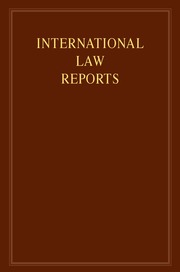No CrossRef data available.
Article contents
Klass Case
Published online by Cambridge University Press: 01 January 2021
Abstract
The individual in international law — Human rights and freedoms — Secret surveillance of communications in interests of national security and public order — Whether legislation providing for surveillance compatible with respect for private life and correspondence — Whether telephone conversations covered by notion of correspondence — Extent to which secret surveillance justified in a democratic society by need to protect that society against sophisticated forms of espionage and terrorism — Surveillance subject only to political safeguards — Whether judicial safeguards required — Whether necessary that subject of surveillance should be informed of measures taken after surveillance has ceased — European Convention for the Protection of Human Rights and Fundamental Freedoms, Article 8
Requirement that States provide a national remedy in respect of any alleged violation of European Convention — Not a prerequisite that a violation first be established — Whether remedy must be judicial — Limited meaning of “effective remedy” in circumstances involving national security — Whether failure to inform subject of surveillance about measures taken after surveillance has ceased a failure to provide an effective national remedy — European Convention for the Protection of Human Rights and Fundamental Freedoms, Article 13
Requirement of due process and public hearing — Whether secret surveillance a violation — European Convention for the Protection of Human Rights and Fundamental Freedoms, Article 6(1)
Procedure under the European Convention — Locus standi — Applicants complaining of existence of surveillance legislation without being able to show that they had ever been placed under surveillance — Whether Applicants victims of a violation of the Convention — Whether Convention creating an actio popularis — Jurisdiction of the European Court of Human Rights and of the Commission — European Convention for the Protection of Human Rights and Fundamental Freedoms, Articles 25 and 27(2)
Keywords
- Type
- Case Report
- Information
- Copyright
- © Cambridge University Press 1980


